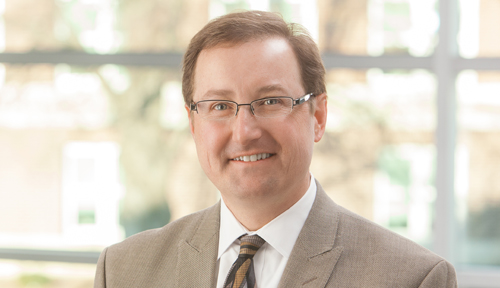Discovery. It's so important to what we do, it is represented by one of the three white parallelograms in our emblem, accompanied by education and health care. The research conducted at Nebraska Medicine and UNMC has improved the health and treatment options for our patients and has made a significant contribution in the global world of clinical research.
To learn more
If you would like to learn more about current clinical trials, contact Deb Meyer, research subject advocate, UNMC Clinical Research Center, at 402-559-6941. Watch for more stories to come spotlighting clinical trials.
"Clinical research is critically important not only to provide access to new treatments under development, but to help our patients of the future," said Christopher Kratochvil, M.D., associate vice chancellor for research at UNMC and vice president of research for Nebraska Medicine. "Our patients and researchers, together, are helping to improve medical care."
In the course of a clinical trial, researchers will evaluate many aspects of the patient's health, more recently including their genetic markers, to better understand why some people respond to the therapy and others don't.
"All drugs and clinical treatments go through a scientific process to verify their effectiveness and safety before these treatments are used in the general population," said LuAnn Larson, manager, UNMC Clinical Research Center. One example of the benefits of research is in the field of infectious disease.
"Hepatitis C is a disease that impacts millions of individuals each year, who historically suffered from chronic infections, which was only managed," Larson said. "Recently, a drug that actually cures Hepatitis C was approved, based upon years of research."
Over the last several years, clinical trials have also led to significant contributions in the treatment patients with cancer. "The survival rates for common cancers have continued to increase," Dr. Kratochvil said. "Those include breast cancer, leukemia and lymphoma. Without clinical trials, the research wouldn't be there to improve outcomes."
Cystic fibrosis is another illness that has greatly benefited from research. "Historically few patients survived into adulthood," Dr. Kratochvil said. "We now frequently have patients living well into adulthood due to new treatments that have improved and extended their lives."
Dr. Kratochvil said UNMC received approximately $100 million this past year in grants and contracts for basic and clinical research. Hundreds of active clinical studies are ongoing at any given time. Dr. Kratochvil and his team are working on a plan to better publicize clinical trials in an effort to recruit more participants. "These breakthroughs couldn't happen if we didn't have patients willing to be part of these trials," he said.
